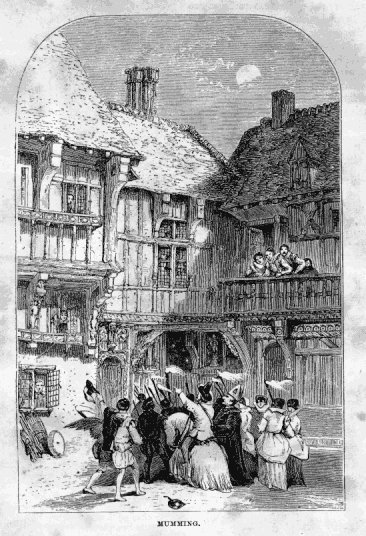Christmas, 1992
Tonight is Christmas Eve, 1992. The University of Houston's College of Engineering presents this series about the machines that make our civilization run, and the people whose ingenuity created them.
Tonight, myth and reality touch -- ordinary things take on extraordinary meaning. At midnight, we are told, the animals talk. They tell one another about the birth of the Christ Child.
In the 19th century, a Canadian Indian told a writer, "On Christmas night all deer kneel and look up to the Great Spirit." And, perhaps, in the long cold night of the North, they do.
The Norse also saw mystical power in their forests. By old Scandinavian tradition, enemies who meet under the mistletoe of an oak tree must lay down their weapons and make a truce. The English variant is kissing. Surely if you and I find the power to make peace this night, we've done better than that.
The Christmas tree came out of Germany only 200 years ago. Homesick Hessian soldiers put up the first American Christmas tree in 1776. Those German/British mercenaries laid off fighting us for one night -- and decorated their tree.
Northern European emigrants established our Christmas-tree custom in the early 1800s. The English adopted it even later.
Our Christmas symbols come down out of the cold North. And they all tell of preparing for birth and for rebirth. The elements are coldness waiting for warmth, quiet waiting for rejoicing, cold stars over warm hearths, and the healing of wounds.
I heard a powerful expression of that symbolic content at this year's Christmas Revels. The Revels is a potpourri entertainment made from folklore. The great folk singer, Jean Ritchie, was part of it. We spoke afterward. "Are you a musician?" she asked. "Only an amateur," I said.
So this Dean of American folk music fixed me with a sure gaze and said, "I'm also an amateur. I've always been an amateur." She made it clear that she was doing what she loved to do. She was doing what she believed in.
And then I saw. Of course the animals speak tonight. Tonight we leave left-brain analysis behind. It's a time to be amateur in all things. It's a time to listen to the stars the way animals do. It's a time to see the passing wind.
At the Revels, we all sang a text that Ritchie had set to an old four-part round tune. The words ask us to put down our weapons under the mistletoe:
What a goodly thing,
If the children of all men,
Could dwell together,
In peace.
So listen to the animals tonight. Find your irrational creative core -- find hope that passes reason. Find a way to disarm your own enmities. And let hope disarm the rational limitations that've bound you -- for the last 364 days.
I'm John Lienhard, at the University of Houston, where we're interested in the way inventive minds work.
(Theme music)
Curtis, W., The Second Nature of Things. Hopewell, N.J.: The Ecco Press, 1992.
The Houston Revels performances took place in Stude Hall, Rice University, Dec. 12 and 13, 1992. The round melody was the one I learned years ago to words with another kind of poignancy:
Rose, Rose, Rose, Rose,
Wilt thou never marry me,
Ah, marry that I will,
If thou but stay.
Since I can't write music in ASCII, I'll spell out the pitches for each line of this tune (one half-note per letter with no dotted rhythms.)
e d e low b
e e f# f# g a f#
b a b g a b
b g e low b
To accommodate the different rhythm of her last line of text Jean Ritchie altered the tune:
in_ peace.
g f# e [rest]

The old English practice of mumming, done each year in Revels, as it was represented in the 1855 National Magazine